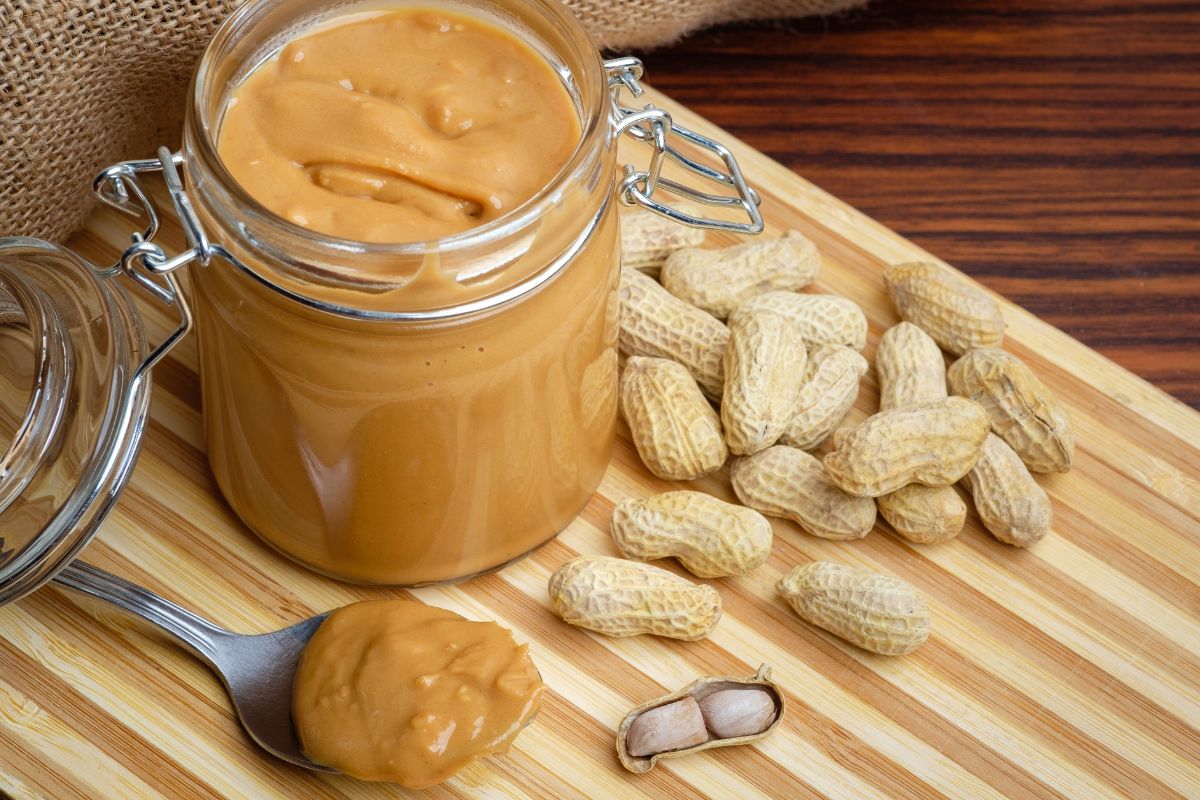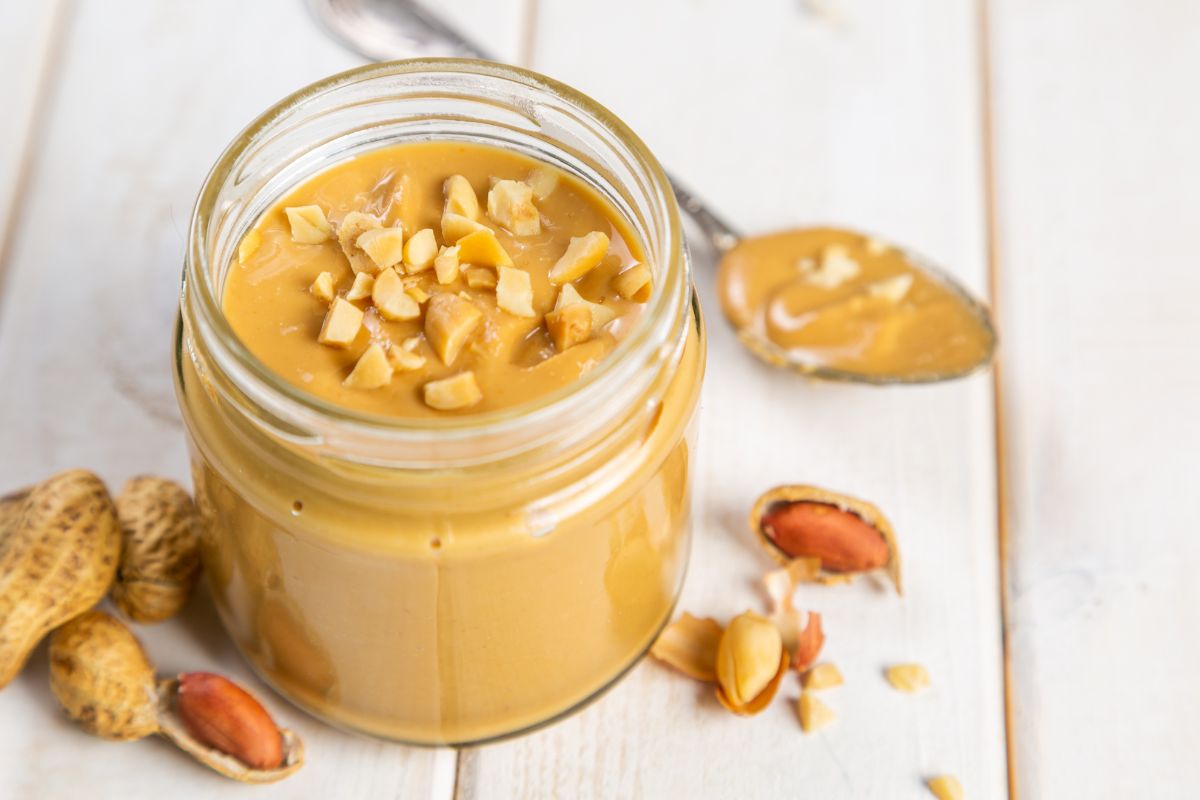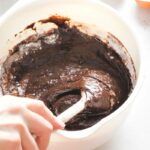Due to its creamy texture and rich flavor, peanut butter is a spread beloved by many. But not only does it taste good, it’s healthy too!

It’s packed with important nutrients like minerals and vitamins, as well as healthy fats.
Peanut butter also has a pretty long shelf life, leading many to wonder if it ever goes bad at all.
Well, we’re here to tell you that, yes, peanut butter does go bad.
Read on to learn more about the signs of bad peanut butter, how long it actually lasts, and how to properly store this delicious spread.
How Can You Tell If Peanut Butter Has Gone Bad?
Most packaged peanut butters have expiration dates printed on the container, which tells you how long you can expect the peanut butter to remain fresh.
Still, it’s not mandatory that packaged peanut butter have these labels. This means that your peanut butter may be good to eat long after its expiration date.
However, you can tell if your peanut butter has gone bad by its smell and appearance.
Fresh peanut butter is creamy and soft, while bad peanut butter may be dry and hard.
It may also be dark brown, rather than its regular light tan hue. It will also have a bitter, sharper, or soapy smell if it’s gone bad.
Your peanut butter may also have a slightly sour flavor rather than a nutty flavor, and this can also indicate that it’s gone bad.
Bear in mind that oil separation is also common for natural peanut butters and not a sign it’s gone bad, as they may have no stabilizer ingredients.
When it comes to powdered peanut butter it can be hard to tell whether it’s gone bad, but you may notice a change in smell, taste, and texture.
How Long Is Peanut Butter Good For?
Peanut butter tends to have a longer shelf life than other spreads because it is high in fat and has a rather low moisture content which can prevent bacterial growth.
But there are a few key factors that can also affect peanut butter’s shelf life.
Most commercial peanut butters contain stabilizers like hydrogenated vegetable oils, as well as preservatives such as sodium benzoate to prolong their shelf life.
Stabilizers prevent oil separation and also improves the appearance and texture of peanut butter, and preservatives such as sodium benzoate help ward off microbial growth.
Due to the inclusion of preservatives and stabilizers, commercial peanut butters can be kept for 6 to 24 months in the pantry if they’re unopened, or 2 to 3 months once they’re opened.
However, storing peanut butter in the fridge can improve its longevity.
However, natural peanut butters need to contain at least 90% peanuts, meaning they have a shorter shelf life due to a lack of stabilizers and preservatives.
Still, some natural peanut butters can have stabilizers in order to prevent oil separation.
Generally, natural peanut butters without stabilizers are good for several months if left unopened in the pantry, or good for a month when opened.
Still, they may be good for up to a year in the fridge if they stay unopened, or 3 to 4 months in the fridge once opened.

A lot of natural peanut butter products that just contain peanuts and salt usually contain disclaimers to ‘refrigerate after opening ‘ to keep it fresh.
Natural peanut butter shelf life can differ between brands because of the inclusion of different ingredients.
Therefore, it’s good to check the expiration date on the packaging.
Meanwhile, powdered peanut butter is a fairly new iteration of peanut butter made by pressing most of the natural oils from roasted peanuts and grinding them into powder.
Most labels will state that they are good for 10 to 12 months if left unopened, or 4 to 6 months when opened.
But powdered peanut butter may have a longer shelf life than the expiration date states if unopened and stored in a dark, dry, and cool place like the pantry.
This is because it has less fat than standard peanut butter, meaning it’s not as likely to react with oxygen.
How To Store Peanut Butter Correctly
To prolong the shelf life of your peanut butter, it’s crucial to properly store it. While you don’t need to refrigerate peanut butter, cold temperatures make sure it lasts longer.
If you would rather not put your peanut butter in the fridge, you should keep it in a dark and cool place like your pantry.
You should always close your jar of peanut butter tightly, as exposing it to oxygen for too long may lead to it going bad faster.
Plus, you should use clean utensils when handling peanut butter. Dirty or used utensils could contaminate peanut butter with bacteria that can speed up spoilage.
Powdered peanut butter should also be kept in a cool, dark and dry place like your pantry.
If powdered peanut butter was mixed with water for a creamier texture, you should store this in a tightly sealed container in the fridge for no more than 2 days.
Final Thoughts
Peanut butter tends to have a long shelf life, with commercial peanut butter lasting 6 to 24 months if left unopened in the pantry, and 2 to 3 months once it’s opened.
Meanwhile, since peanut butters do not have preservatives, they may last a few months if left unopened, or a month once opened.
Still, some natural peanut butter brands may last longer because they contain stabilizers, so it’s a good idea to check the expiration date.
Powdered peanut butter should also be stored in a cool, dark and dry place like the pantry, and their expiration dates normally state they’re good for up to a year.
Still, it is certainly possible for powdered peanut butter to last more than a year, as it contains ingredients that are less likely to spoil.
Proper storage and usage – including refrigeration – can considerably prolong the shelf life of any peanut butter product.
Signs that your peanut butter has spoiled include a dry, hard texture, changes to the smell (including no smell at all), and a bitter or sour flavor.
- How To Reheat A Cheesesteak - November 5, 2023
- What Are Three Must Have Kitchen Knives? - September 22, 2023
- How To Protect Edges Of Pie Crust - June 15, 2023








